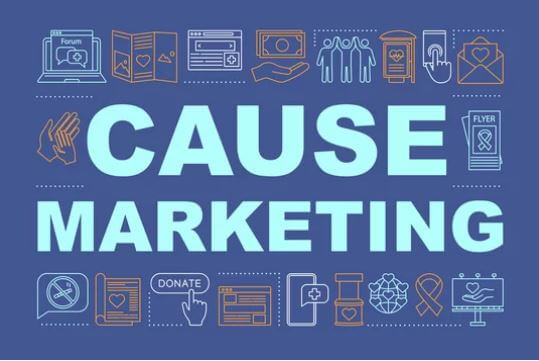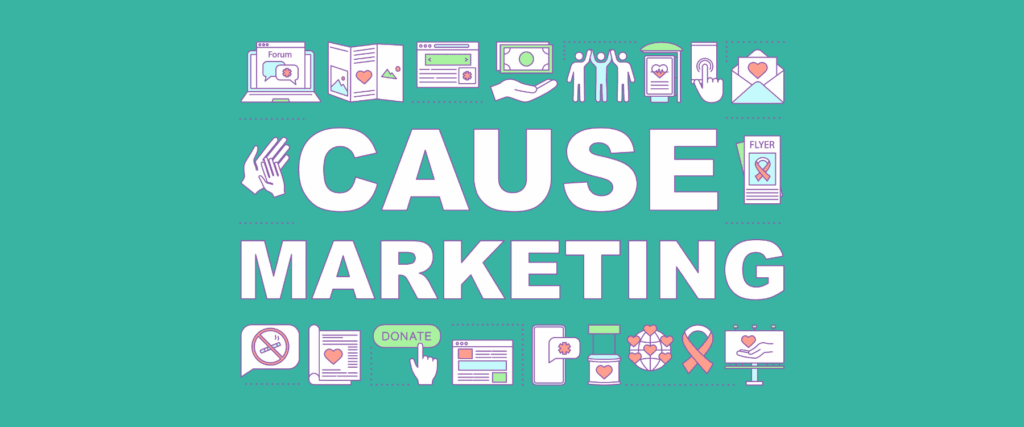Cause Marketing
Introduction to Cause Marketing
Cause marketing refers to a strategic partnership between a for-profit company and a nonprofit organization that benefits the business and the cause it supports. The business gains exposure, customer loyalty, and positive public relations, while the nonprofit receives financial support and increased visibility.

Definition of Cause Marketing
Cause marketing is a form of corporate social responsibility (CSR) that aligns a company’s brand and values with a specific cause or nonprofit organization. This type of marketing leverages the power of the brand to raise awareness and funds for a social issue. It can include various activities, such as product promotions, cause-related events, and social media campaigns.
Benefits of Cause Marketing
There are several benefits to incorporating cause marketing into a company’s overall cause marketing strategy. Some of the most significant benefits include the following:
- Positive brand image: By partnering with a nonprofit, a company can demonstrate its commitment to positively impacting the community and increase its reputation as a socially responsible business.
- Increased customer loyalty: Studies have shown that customers are more likely to support a brand that supports a cause they care about.
- Differentiation: By aligning with a specific cause, a company can differentiate itself from its competitors and create a unique brand identity.
- Increased sales: Cause marketing can drive sales by attracting new customers looking to support a cause and retaining existing customers who appreciate the company’s commitment to social responsibility.
Cause marketing is a win-win for the business and the cause it supports. By aligning with a reason, companies can improve their image and bottom line while positively impacting the community.
Choosing a Cause to Support
Cause marketing is a powerful tool for businesses to make a positive impact in their communities and improve their brand image. However, choosing the right cause to support is crucial for the success of a cause marketing campaign. Here are some key considerations to keep in mind when selecting a reason.
Identifying Causes Aligned with Your Business
The first step in choosing a cause to support is identifying causes that align with your business values and mission. For example, if your company is focused on environmental sustainability, you may want to consider supporting a reason related to environmental protection or conservation.
Evaluating the Potential Impact of Your Support
Once you have identified a list of potential causes, it is essential to evaluate the potential impact of your support. Consider the size and reach of the reason and the resources you have available to support it. You may also want to consider factors such as the level of need for the cause and the potential for your support to make a meaningful difference.
Considerations for Choosing a Cause
In addition to the impact of your support, there are several other considerations to keep in mind when choosing a cause, including:
- Relevance to your target audience: Consider the cause’s appeal to your target audience and the level of engagement they have with the reason.
- Compatibility with your brand image: Ensure your chosen cause is compatible with your brand image and values. A reason not aligning with your brand can negatively impact your image and reputation.
- Feasibility: Make sure the cause you choose is feasible for your company to support, both in terms of the resources required and the level of impact that can be made.
Choosing the right cause to support is crucial for the success of a cause marketing campaign. By evaluating the potential impact of your support and considering factors such as relevance and compatibility, you can ensure that your cause marketing efforts are well-targeted and effective.
Developing a Cause Marketing Campaign
Once you have chosen a cause to support, the next step is to develop a cause marketing campaign that effectively leverages the power of your brand to raise awareness and funds for the cause. Here are some critical steps to keep in mind when developing your campaign.
Setting Campaign Goals and Objectives
Before developing your cause marketing campaign, you must set clear goals and objectives for what you hope to achieve. Consider the number of funds you wish to raise, the level of exposure you want for the cause, and the impact you desire to make.
Determining the Target Audience
The next step is to determine the target audience for your campaign. This will help you choose the best format and message for your campaign and ensure that you reach the right people with your message.
Creating a Message and Call to Action
Once you have determined your target audience, the next step is to create a message and call to action for your campaign. Consider what motivates your target audience to support the cause and use this information to craft a compelling message that resonates with them.
Deciding on the Campaign Format
The next step is to decide on the format for your campaign. This could include a product promotion, an event, a social media campaign, or a combination of these. Consider the resources you have available, as well as the impact you hope to make when choosing the format for your campaign.
Implementing and Executing the Campaign
Finally, it is time to implement and execute your campaign. This may involve various activities, such as advertising, public relations, social media, and partnerships with other organizations. Make sure to closely monitor your campaign to ensure that you meet your goals and make the impact you hope to make.
Developing a cause marketing campaign requires careful planning and execution. By setting clear goals and objectives, determining the target audience, creating a compelling message, choosing the correct format, and executing your campaign effectively, you can leverage the power of your brand to make a positive impact in your community and beyond.
Measuring the Success of Your Cause Marketing Efforts
Once you have implemented your cause marketing campaign, it is essential to measure its success to determine its impact and identify areas for improvement. Here are some key metrics to consider when evaluating the success of your cause’s marketing efforts.
Funds Raised
One of the most straightforward metrics to evaluate the success of your cause marketing campaign is the number of funds raised. This metric provides an objective measure of the impact of your campaign and the resources available to support the cause.
Awareness Raised
Another essential metric to consider is the awareness raised for the cause. This can be measured by tracking the number of people reached through various channels, such as social media, events, and media coverage.
Social Media Engagement
Social media engagement is another key metric to evaluate the success of your cause’s marketing efforts. This can be measured by tracking the number of likes, shares, and comments on your social media posts related to the reason.
Sales Impact
If your cause marketing campaign is tied to product promotion, measuring the impact on sales is essential. This will help you determine your campaign’s effectiveness and impact on your bottom line.
Customer Feedback
Finally, it is essential to gather customer feedback to determine their satisfaction with the cause marketing campaign. This can be done through surveys, focus groups, or other methods and can provide valuable insights into the impact of your campaign and areas for improvement.
Measuring the success of your cause marketing efforts is crucial for ensuring that your campaigns are effective and making the impact you hope to make. By tracking metrics such as raised funds, awareness, social media engagement, sales impact, and customer feedback, you can gain valuable insights into the effect of your cause’s marketing efforts and make informed decisions about future campaigns.
Challenges and Best Practices in Cause Marketing
While cause marketing can be a powerful tool for raising awareness and funds for important causes, many challenges can also arise. Understanding these challenges and best practices can help you to develop successful and impactful cause marketing campaigns.
Authenticity and Transparency
One of the biggest challenges in cause marketing is maintaining authenticity and transparency. Consumers are increasingly skeptical of cause marketing efforts. It is essential to ensure that your campaign is genuine and that the funds raised directly support the cause.
Aligning with the Brand
Another challenge in cause marketing is ensuring that the cause you choose aligns with the values and mission of your brand. This will help to ensure that the campaign resonates with your target audience and makes a positive impact.
Measuring Impact
Measuring the impact of your cause’s marketing efforts can also be a challenge. It is important to track metrics such as raised funds and awareness, but it can also be challenging to determine the full impact of your campaign.
Best Practices
To overcome these challenges and ensure the success of your cause’s marketing efforts, it is essential to follow best practices, such as:
- Choose a reason that aligns with your brand values and mission
- Ensure transparency and authenticity in your campaign
- Establish clear goals and objectives for your campaign
- Measure the impact of your campaign through metrics such as funds raised and awareness raised
- Partner with reputable organizations to support the cause
- Engage your customers and stakeholders in the cause marketing effort
- Continuously evaluate and improve your cause marketing campaigns
Cause marketing can be a powerful tool for raising awareness and funds for important causes, but it is essential to approach it with care and attention to best practices. By following these guidelines, you can ensure that your cause marketing efforts are practical and impactful and make a positive difference in your community and beyond.
Conclusion
Cause marketing is a form of marketing that involves partnering with a nonprofit or charitable organization to promote a cause and raise funds. This type of marketing can be a powerful tool for raising awareness and support for fundamental reasons while promoting your brand and engaging your customers.
To develop effective and impactful cause marketing campaigns, it is essential to choose a cause that aligns with your brand values and mission, ensure transparency and authenticity in your campaign, establish clear goals and objectives, measure the impact of your campaign, and follow the best practices for cause marketing.
Measuring the success of your cause marketing efforts is crucial for ensuring that your campaigns are effective and making the impact you hope to make. By tracking metrics such as raised funds, awareness, social media engagement, sales impact, and customer feedback, you can gain valuable insights into the effect of your cause’s marketing efforts and make informed decisions about future campaigns.
In conclusion, cause marketing can be a valuable tool for businesses and nonprofits, allowing them to work together to impact important causes positively. With careful planning, execution, and evaluation, cause marketing campaigns can be impactful, effective, and successful in promoting your brand and supporting important causes.
F.A.Q
Why is causing marketing essential?
Cause marketing is essential for several reasons:
- Making a positive impact: By partnering with a nonprofit or charitable organization, businesses can positively impact essential causes and help raise awareness and funds for these causes.
- Building brand reputation: By supporting a cause, businesses can enhance their reputation and build positive relationships with customers, stakeholders, and the community.
- Engaging customers: Cause marketing can be a powerful way to engage customers and create a sense of loyalty and community around a brand.
- Differentiating from competitors: By supporting a cause, businesses can differentiate themselves from competitors and demonstrate their commitment to positively impacting society.
- Improving employee morale and engagement: By supporting a cause, businesses can improve employee morale and concentration, as employees are often motivated to work for companies that positively impact the world.
Overall, cause marketing is a powerful tool for businesses to positively impact important causes, build their brand reputation, engage customers, differentiate themselves from competitors, and improve employee morale and engagement.
What is an example of cause marketing?
An example of cause marketing is the partnership between Starbucks and the Alliance for a Healthier Generation to promote healthy habits for kids and families. Starbucks has pledged to promote more nutritious food and beverage options and encourage customers to adopt healthier habits. At the same time, the Alliance for a Healthier Generation works to improve children’s health by addressing the childhood obesity crisis. Through this partnership, Starbucks can support a cause that aligns with its values and mission while engaging customers and promoting its brand.





